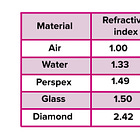Thursday, September 12, 2024
Speed of light and anisotropy (variation in light speed inbound and outbound) and the consequences)
If true, Relativity, the Big Bang and modern cosmology are entirely rubbished. As if they were not already.
by StFerdIII
Introduction
Previous posts discussed how the speed of light was computed to be 300.000 km per second. These are largely mathematical exercises and are incomplete. According to this accepted theory, the speed of light is about a billion miles per hour. Does anyone really believe you can measure such a speed? I don’t and the reasons are given below.
Many scientists also agree that measuring such a speed is impossible. A billion miles per hour is simply an unimaginable, untraceable velocity. If the speed of light is inconstant, which it most certainly is, and if the vacuum of space does not exist which it most certainly does not; and if we can’t really measure a beam of light moving away from us to be one billion miles per hour which we can’t, modern cosmology and physics are entirely rubbished. Worldviews would be ravaged. Entire groups of people would be lost and forlorn, their religiosity, if not their entire existence called into disrepute.
Light is not a constant speed
We have argued on this substack (quite correctly), that the speed of light as experimentally proven by Sagnac, gyroscopes and satellite emissions, can never be a constant velocity. Many in mainstream physics know this and some are courageous enough to publish their doubts, putting their careers at risk. An example is B. Koberlein who expressed his scepticism in Universe Today and admitted we cannot measure the speed of light, even if we use the discredited philosophies and maths of Relativity. If the speed of light is wrong, the entire ‘long age’ history of our universe needs a complete reconsideration.
“several physicists have pointed out that while relativity assumes the vacuum speed of light is a universal constant, it also shows the speed can never be measured. Specifically, relativity forbids you from measuring the time it takes light to travel from point A to point B. To measure the speed of light in one direction, you’d need a synchronized stopwatch at each end, but relative motion affects the rate of your clocks relative to the speed of light. You can’t synchronize them without knowing the speed of light, which you can’t know without measuring. What you can do is use a single stopwatch to measure the round-trip time from A to B back to A, and this is what every measurement of the speed of light does.”
What does the above mean? More here
